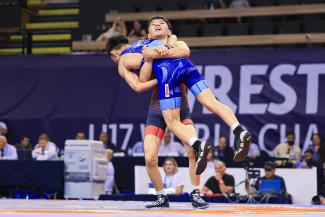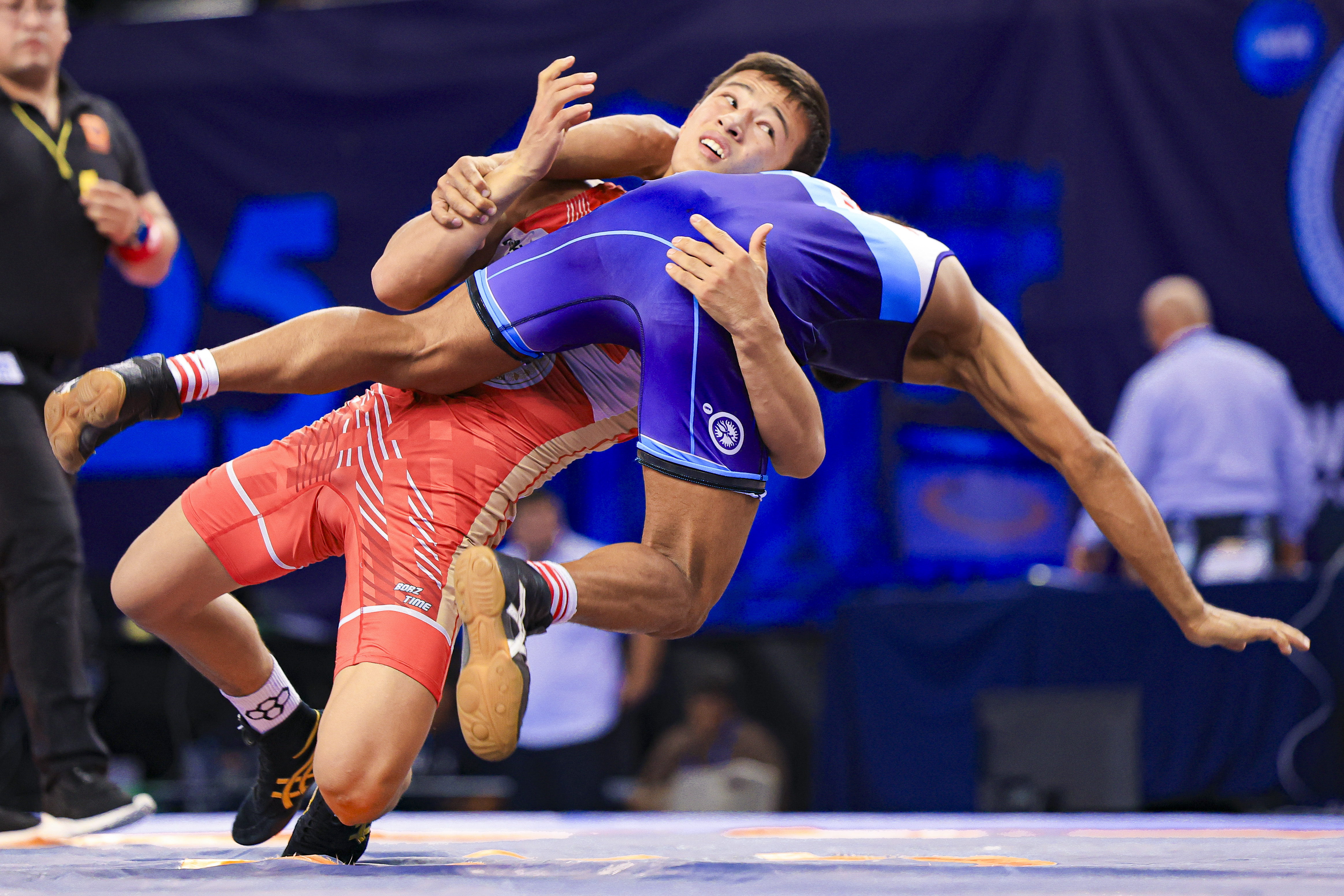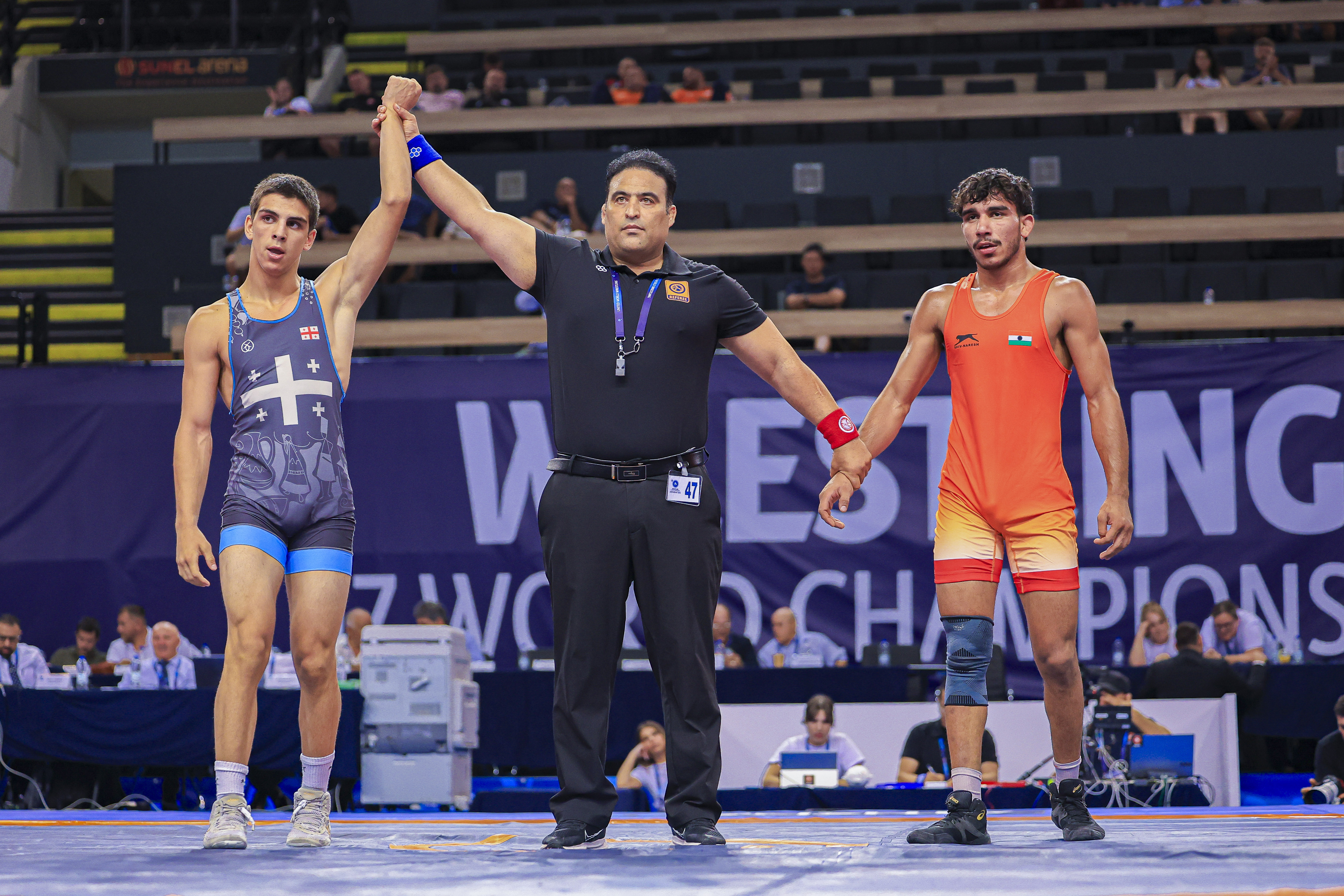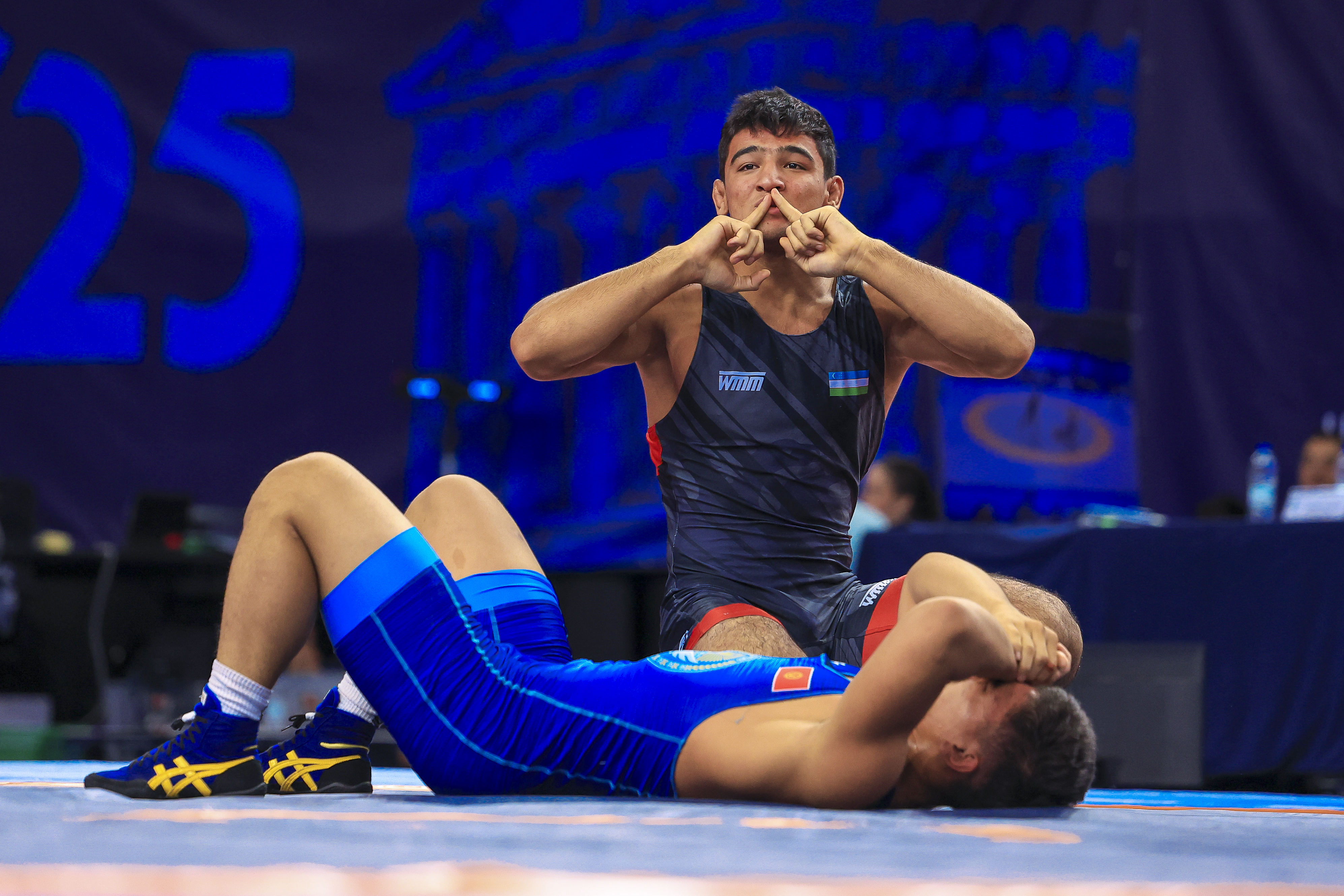Malmgren boosts Olympics preparations with U23 Euro title
Thursday, May 23, 2024 - 18:01 By United World Wrestling Press

BAKU, Azerbaijan (May 23) -- Jonna MALMGREN’S (SWE) social media bio, glittering with gold medal emojis, will soon have a new addition.
A three-time European medallist [two gold and a silver], four-time U17 and U20 European medal winner, a U20 world champion and a Youth Olympics gold medallist, the Paris Olympic-bound wrestler added another title to her overflowing cabinet. The 23-year-old, on Thursday, won her second consecutive U23 European Championship gold medal here.
And she did it with minimal fuss, winning the final against Mariia VYNNYK (UKR) 5-0.
Competing in the 55kg category instead of her usual 53kg, Malmgren conceded only two points in her four bouts and that too in her opening match against Tuba DEMIR (TUR). After that 10-2 win, she didn’t allow any of her opponents the slightest of chances to nick a point from her.
 Jonna MALMGREN (SWE) used a duck under to score two points over Mariia VYNNYK (UKR) in the 55kg final. (Photo: United World Wrestling / Kadir Caliskan)
Jonna MALMGREN (SWE) used a duck under to score two points over Mariia VYNNYK (UKR) in the 55kg final. (Photo: United World Wrestling / Kadir Caliskan)
In the gold medal bout, Vynnyk tried testing Malmgren’s patience by blocking her attacking channels but the Swede isn’t a one-trick wrestler, as she has shown in the past.
Malmgren’s wrestling style can outfox many. She is never steady on the mat. Her legs constantly shuffle back and forth, and she moves around in circles. Her hands are always trying to break the opponent’s defense and the prying eyes look for the tiniest of gaps that she could exploit with her breathtaking speed.
Her Ukrainian opponent learned it the hard way. If Vynnyk planned to keep the scoreline close, she succeeded to an extent. But it was always going to be tough to sustain that level of defense, especially with the risk of being penalized for passivity, which she was inside the first two minutes of the bout.
Malmgren upped the ante in the second period, using a duck under to add two points to her tally. Then, with a little more than a minute remaining, she got control of Vynnyk’s arm and neck before turning her over onto her back for two more points.
Malmgren ran to her corner to celebrate her second consecutive title, the kind of performance that will leave her in good stead in the build-up to the Paris Olympics.
 Mariia ORLEVYCH (UKR) defeated Laura KUEHN (GER) to win the 76kg gold medal. (Photo: United World Wrestling / Kadir Caliskan)
Mariia ORLEVYCH (UKR) defeated Laura KUEHN (GER) to win the 76kg gold medal. (Photo: United World Wrestling / Kadir Caliskan)
It was a mixed day for Ukrainian wrestlers, who featured in three out of the five finals that were held on Thursday and lost two while winning one.
Minutes after Vynnyk lost to Malmgren, Elizaveta PETLIAKOVA (AIN) defeated Manola SKOBELSKA (UKR) 9-2 in the final of the 68kg category. It was the biggest title so far of the 20-year-old former U20 European silver medallist’s career.
But Mariia ORLEVYCH (UKR) ensured her country didn’t end the opening day of women’s wrestling with zero gold medals.
The former U20 European Championship silver medallist won the first title of her career as she defeated Laura KUEHN (GER) 6-0 in a lopsided 76kg final.
Orlevych looked in sublime form and was in the attacking mode from the get-go. Within the first 60 seconds, the Ukrainian used a one-on-two and scored a takedown over Kuehn for two points.
Kuehn defended well for the rest of the period but mid-way through the second period, Orlevych was on the offensive again, using the arm-drag to push her opponent on the mat for a further two points. Desperate to make a comeback, a tired Kuehn went for a single-leg attack but missed and Orlevych caught her on the counter to add two more points and seal the bout.
 Natallia VARAKINA (AIN), right, celebrates after winning the 50kg gold medal after beating Zehra DEMIRHAN (TUR), left, in the final. (Photo: United World Wrestling / Kadir Caliskan)
Natallia VARAKINA (AIN), right, celebrates after winning the 50kg gold medal after beating Zehra DEMIRHAN (TUR), left, in the final. (Photo: United World Wrestling / Kadir Caliskan)
Earlier in the finals session, Natallia VARAKINA (AIN) won the gold medal in the most dramatic of circumstances, beating Zehra DEMIRHAN (TUR) 8-8 on criteria in the 50kg final.
Varakina led 8-4 with only 10 seconds remaining but Demirhan cut the deficit to two points with a push-out and a caution to Varakina. As the clock ticked down, with just seven seconds remaining, Demirhan forced another takedown to level the scores at 8-8. However, as she tried to sneak in another point, the time was up and Varakina was declared the winner by the virtue of a higher-point hold.
 Alesia HETMANAVA (AIN) held on to a 5-3 win over Anastasiia SIDELNIKOVA (AIN) in the 59kg final. (Photo: United World Wrestling / Kadir Caliskan)
Alesia HETMANAVA (AIN) held on to a 5-3 win over Anastasiia SIDELNIKOVA (AIN) in the 59kg final. (Photo: United World Wrestling / Kadir Caliskan)
The 59kg final, a battle between two former U20 world champions, Alesia HETMANAVA (AIN) held on to a close 5-3 win over Anastasiia SIDELNIKOVA (AIN). Hetmanava was leading 4-0 with 25 seconds left in the bout when Sidelnikova scored her first point using a stepout. Both got in a tangle and Sidelnikova tripped Hetmanava who fell on her back and in danger of a fall, surviving that position as the time ran out.
Sidelnikova challenged asking for four points but the judges upheld the original decision of two points and Hetmanava won the gold medal 5-3.
 Liliia MALANCHUK (UKR) will wrestle for the 53kg gold medal on Friday. (Photo: United World Wrestling / Jake Kirkman)
Liliia MALANCHUK (UKR) will wrestle for the 53kg gold medal on Friday. (Photo: United World Wrestling / Jake Kirkman)
Ukraine puts three more in finals
Meanwhile, on Friday, Ukraine will have more chances to win a women’s wrestling gold medal at the U23 European Championships when their three more wrestlers take to the mat in the gold medal bouts on Friday.
Leading the way for them in Thursday’s early rounds and the semifinals was the U23 European Championship silver medallist and U23 Worlds bronze medal winner Liliia MALANCHUK (UKR) at 53kg.
Malanchuk didn’t concede a single point en route to the final, beating Venera NAFIKOVA (AIN) 8-0 in the quarterfinals and Laura STANELYTE (LTU) 7-0 in the semis. She will face home favorite Elnura MAMMADOVA (AZE) in the final.
Joining her in the title bout will be U20 European champion and U23 Worlds silver medallist Iryna BONDAR (UKR). Bondar wasn’t tested in her early rounds but was challenged in the semifinals by Alina KASABIEVA (AIN), who tried to make a late comeback. Bondar, however, prevailed 7-4 to set up a final encounter with Yana TRETSIAK (AIN) at 62kg.
The third Ukrainian in the final will be Nadiia SOKOLOVSKA (UKR) who, like her compatriot, was dominant in all her bouts. She will face Alina SHAUCHUK (AIN) in the 72kg gold medal match.
Paris-bound and former world champion Irina RINGACI (MDA) will wrestle for the 65kg after she showed the gulf in class at the age-group level. She scored a 10-0 win in the quarterfinal and then handed another Paris-bound wrestler, Nesrin BAS (TUR), a 8-2 loss. She will take on Ekaterina KOSHKINA (AIN) for the gold medal.
Koshkina dominated her semifinal 12-2 against Ingrid SKARD (NOR) but survived a scare in the quarterfinal against Kateryna ZELENYKH (ROU). Trailing 10-5, Koshkina secured a fall over Zelenykh.
The 57kg final will be a battle between Zhala ALIYEVA (AZE) and Elvira KAMALOGLU (TUR).
RESULTS
50kg
GOLD: Natallia VARAKINA (AIN) df. Zehra DEMIRHAN (TUR), 8-8
BRONZE: Ana Maria PIRVU (ROU) df. Khrystyna BASYCH (SVK), 6-2
BRONZE: Natalia WALCZAK (POL) df. Gabija DILYTE (LTU), 5-2
55kg
GOLD: Jonna MALMGREN (SWE) df. Mariia VYNNYK (UKR), 5-0
BRONZE: Mihaela SAMOIL (MDA) df. Tuba DEMIR (TUR), 8-4
BRONZE: Anastasiia IANDUSHKINA (AIN) df. Aliaksandra BULAVA (AIN), 13-3
59kg
GOLD: Alesia HETMANAVA (AIN) df. Anastasiia SIDELNIKOVA (AIN), 5-3
BRONZE: Ruzanna MAMMADOVA (AZE) df. Ana Maria PUIU (ROU), via fall (8-0)
BRONZE: Amel REBIHA (FRA) df. Sevim AKBAS (TUR), 6-1
68kg
GOLD: Elizaveta PETLIAKOVA (AIN) df. Manola SKOBELSKA (UKR), 10-2
BRONZE: Viktoryia RADZKOVA (AIN) df. Sophia SCHAEFLE (GER), via fall
BRONZE: Karolina POK (HUN) df. Luciana BEDA (MDA), 5-3
76kg
GOLD: Mariia ORLEVYCH (UKR) df. Laura KUEHN (GER), 6-0
BRONZE: Zsofia VIRAG (HUN) df. Nazar BATIR (TUR), 4-2
BRONZE: Olga KOZYREVA (AIN) df. Daniela TKACHUK (POL), via fall (5-4)
Semifinals
53kg
GOLD: Liliia MALANCHUK (UKR) vs. Elnura MAMMADOVA (AZE)
SF 1: Elnura MAMMADOVA (AZE) df. Laura STANELYTE (LTU), 7-0
SF 2: Liliia MALANCHUK (UKR) df. Sevval CAYIR (TUR), 11-0
57kg
GOLD: Zhala ALIYEVA (AZE) vs. Elvira KAMALOGLU (TUR)
SF 1: Zhala ALIYEVA (AZE) df. Solomiia VYNNYK (UKR), 3-1
SF 2: Elvira KAMALOGLU (TUR) df. Volha HARDZEI (AIN), 8-0
62kg
GOLD: Yana TRETSIAK (AIN) vs. Iryna BONDAR (UKR)
SF 1: Yana TRETSIAK (AIN) df. Viktoria VESSO (EST), 4-4
SF 2: Iryna BONDAR (UKR) df. Alina KASABIEVA (AIN), 7-4
65kg
GOLD: Ekaterina KOSHKINA (AIN) vs. Irina RINGACI (MDA)
SF 1: Irina RINGACI (MDA) df. Nesrin BAS (TUR), 8-2
SF 2: Ekaterina KOSHKINA (AIN) df. Ingrid SKARD (NOR), 12-2
72kg
GOLD: Nadiia SOKOLOVSKA (UKR) vs. Alina SHAUCHUK (AIN)
SF 1: Nadiia SOKOLOVSKA (UKR) df. Olesia BEZUGLOVA (AIN), via fall (7-0)
SF 2: Alina SHAUCHUK (AIN) df. Bukrenaz SERT (TUR), 2-1



 Asian U17 champion Alkham ABDIRASULOV (KGZ) reached the World U17 Championships final at 55kg. (Photo: United World Wrestling / Amirreza Aliasgari)
Asian U17 champion Alkham ABDIRASULOV (KGZ) reached the World U17 Championships final at 55kg. (Photo: United World Wrestling / Amirreza Aliasgari) Erekle TAVBERIDZE (GEO), European U17 champion, reached the 65kg final in Athens and will taken on Janes NAZARYAN (ARM), an opponent he defeated in Euro final. (Photo: United World Wrestling / Amirreza Aliasgari)
Erekle TAVBERIDZE (GEO), European U17 champion, reached the 65kg final in Athens and will taken on Janes NAZARYAN (ARM), an opponent he defeated in Euro final. (Photo: United World Wrestling / Amirreza Aliasgari) Abdulaziz KHOLMIRZAEV (UZB) pinned Nurislam OSKONBAEV (KGZ) in the 80kg semifinal. (Photo: United World Wrestling / Kadir Caliskan)
Abdulaziz KHOLMIRZAEV (UZB) pinned Nurislam OSKONBAEV (KGZ) in the 80kg semifinal. (Photo: United World Wrestling / Kadir Caliskan) Asian U17 champion HARDEEP (IND) defeated Emrullah CAPKAN (TUR) in the 110kg semifinals. (Photo: United World Wrestling / Kadir Caliskan)
Asian U17 champion HARDEEP (IND) defeated Emrullah CAPKAN (TUR) in the 110kg semifinals. (Photo: United World Wrestling / Kadir Caliskan)
Share your thoughts.
Comments